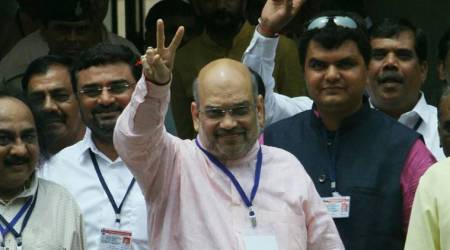 Former Sri Lankan wicket keeper batsman Kumar Sangakkara has called Mendis his heir. (Source: Reuters)
Former Sri Lankan wicket keeper batsman Kumar Sangakkara has called Mendis his heir. (Source: Reuters)
A lush foliage of sprawling grandfatherly trees delinks the throbbing Colombo-Galle highway from the Tyronne Fernando Stadium, once an international venue but now in decrepit shambles, immune to the leaps to urbanity its Colombo cousins had taken. There is a sports shop, a dingy office room, a spacious ground well-canopied on the edges, and the Moratuwa Sports Club. The dimly-lit hall of the club stinks of cheap liquor and is strewn with cigarette butts. Apparently, at dusk it turns into a watering hole, the club’s oldies dusting up old memories. But now there is only Jayalath Aponso, the coach of Moratuwa Cricket Academy, his three friends and the bartender. All sober and quiet and leisurely, watching a six-a-side game on the poya day. The creases on Aponso’s forehead widen before in a low, stuttering voice he says, “You’ve come to meet Kusal’s coach?” After a half-a-second pause, he confirms with a welcoming nod. “I’m his coach.” Before he corrects himself: “(Rather), I was.”
However, he seems to enjoy the new-found attention after his ward Kusal Mendis’ latest exploit — a breathtaking counter-attacking hundred against India on an inferno of a wicket, playing sweep after sweep that gave Sri Lanka a glimmer of hope of drawing the match. Maybe, more than that, he is being marvelled as the next big batsman from the country, with some even suggesting that he could be the spiritual heir to the likes of Aravinda de Silva, Mahela Jayawardene and Kumar Sangakkara. The legendary left-hander had already announced that Mendis is not just his heir apparent but already his heir, considerably more evolved than when he was 21. Not just the knock against India, Mendis produced a similar effort of unrestrained aggression against Australia in Pallekele last year, against Mitchell Starc at his furious best, reverse swinging the ball to his whim in the second innings. His arrival couldn’t have been better timed, at a time when Sri Lanka are in the throes of an erratic transition, when even some of the more established players are struggling to realise their optimal potential. For chief selector Sanath Jayasuriya, he affords an excuse when people blame him for Sri Lanka’s limp performances. “I can show Kusal and tell them, look how well the boy’s done,” he says. He is suddenly the toast of a nation. Even his long-forgotten coach is getting his share of the attention.
“Yeah, yeah,” agrees Aponso. He then slinks behind the bar door, kneels down and from a pile of albums, selects a few shabby ones and flips through them. Sensing what the eyes are looking for, he says: “There is no picture of Kusal. I can take his picture anytime. He’s my boy, after all,” he says, turning his head and hand in the direction of Kusal’s new house. There are several photographs of Aponso with Sachin Tendulkar, Martin Crowe, Graham Gooch and even Dermot Reeve. “Taken when I was the assistant coach of the Sri Lankan team in the 90s,” he proudly says. Then he pulls out from the back of the album cover a Sinhalese newspaper clipping of Kusal Mendis with his parents. It should be recent, for its still glossy. Pointing out his father, he says: “He’s his real coach, not me or any others. Maybe, he is fulfilling his own ambitions through his son.” Crushed ambitions, rather.
In the late 70s before his father Dinesh began plying a trickshaw to sustain his family, he was an aspiring cricketer himself, a regular in the local U-13 and U-15 side. Some locals say he was more talented than Kusal, but forsake his dreams for the family. He dropped out of school and began helping his father with carpentry. “He was good, I’ve heard, but I have only vague memories of his father playing cricket,” Aponso says.
He, though, has a clear memory of Dinesh bringing Kusal to the academy. “He told me he wanted me to coach his son. I looked at the boy, he must have been six or seven then and looked even younger, and said that I can’t take him now. I don’t remember Dinesh saying anything, but the boy started crying, before I finally agreed,” he recollects.
The next morning, Kusal was at the gate of the stadium with a kit considerably larger than him. “I asked his father why he can’t carry the kit? The reply stunned me. He told me he had to get used to it. He would watch his boy train and I have heard stories that he would observe me closely and repeat it to his son at home,” he says. Initially, Aponso was a little apprehensive that Dinesh was a pushing his son too hard and used to give him just throwdowns “without any pace”. But one day, to his utter surprise, he saw Kusal bowling leg-spin at the nets. “Nobody had shown him how to bowl, and the ball was comfortably reaching the batsman and even turning after pitching. My brother told me we can groom him to be a spinner, like I nurtured Kumar Dharmasena,” he says. But Aponso didn’t buy that idea. He is a non-conformist. He then flipped the sheets of his album and showed a black and white photograph of a noodle-haired man with a bushy French beard. “Andy Roberts of Lanka, eh” you ask him. “No, the Malinga before Malinga,” intervenes the bartender. “It was one of the reasons maybe I didn’t play for Sri Lanka,” he says, ripples of laughter echoing in the room.
Aponso’s methods were unorthodox, he affirms. “For the first month, I tell my boys to bat just with the top hand. If your top hand is steady, you get more balance in your strokes and the head won’t fall over. The bottom hand should be used only for support. I used to bowl at good pace to them, with my slinging action. So they developed great reflexes too,” he says.
At his academy, every session was devoted to honing just one stroke. “If it’s the day for sweeps, they would only sweep and I made them play that shot a few hundred times everyday. It develops their muscle memory,” he points out. No wonder, Kusal is an outrageous sweeper.
Before his sweeps broke the heart of Indian bowlers. he swept the hearts of the Barmy Army who played an exhibition match with the academy students during England’s tour of Sri Lanka. “They were so impressed that they gave their bats to them and other cricketing gear to the academy. Our boys still use them,” he says, laughing. With more recognition and rewards, Kusal’s visits to the academy became less frequent. But he drops in occasionally to “seek my blessings”. “He calls me before every big tour and will ask me if I spot anything. I just tell him ‘stay focused, you’re the next Sri Lankan captain’.” It will be consummation of a father’s suppressed dreams.
“Sorry, you can’t go to his house,” chides the handlebar moustachioed security guy at the entrance of the Prince of Wales College. It was just a casual enquiry about the direction to his house. Seeing the perplexed face, he explains in the same rebuking tone, “You know he’s the next Sri Lanka captain. An Indian going to his house might be considered fishy. Who knows whether you’re a bookie or not?” The Mendis’ moved out of their old locality just before the series against Bangladesh. The new house is in Gorakana, further down the Galle Road en route to Panadura. It meant Fernando Zoyza doesn’t get to spend enough time with his friend Dinesh. Zoyza runs a one-roomed “supermarket” which sells everything from grocery to stationary and fruits to soft drinks. “Even beer too,” he says. Dinesh used to park his trickshaw at the nook of the bend into his “supermarket”. “Before Kusal became a star, we used to spent a lot of time chit-chatting here. But these days, I hardly see him. But nice man, struggled a lot for his family, especially Kusal. He worked everyday and carefully spent his money. Until a few years ago, he didn’t even have a mobile phone. Who doesn’t these days?” he asks.
Among the various struggles for making Kusal’s life better was finding a good school for him. He first approached the prestigious St Sebastian’s School, an institution of the elites. But they didn’t give him admission, despite “he being a Catholic”, Zoyza stresses. He finally managed to get him a seat at the Prince of Wales College. “He had that hurt in his mind that he always used to score heavily against them. But it made him an international cricketer,” says Aponso. But fame and a new house ushered in new perils. A month after he moved into the new house, a couple of burglars sneaked in and stole money and valuables worth LKR 3 lakhs. “They caught them in two days,” Zoyza says, triumphantly. After all, he’s the future Sri Lankan captain. Forget the bookie part. There is an immense popular perception that he would go on to become Sri Lanka captain. His former U-15 coach Sumith Fernando laughs when he hears this. “I can’t tell you he’ll be our captain, but he definitely can be our number one batsman, if he already isn’t. But he has a lot of leadership skills,” he says.
He remembers Kusal as a silent boy with an occasional streak of mischief. He didn’t mind that as long he worked hard on his batting. “He was a boy who wanted to do everything, ‘keeping, bowling and batting. And he worked equally hard on everything. By the time he was in the U-13 team, he had already developed his batting, much more than any youngster of his age,” he says. It’s not just Fernando who throws in the the mature-than-his age allusion. Even Sangakkara has voiced it several times. “At his age, I couldn’t match,” he had once said. The former skipper seems to have a special affection for him and was once livid when the selectors dropped him. When Mendis was in England for the Champions Trophy, he used to visit Sangakkara’s house in London and get tips from him. “He’s like that. will eat your brains, the sort of kids coaches love. He was always our pet.”
His maturity beyond his age is a reason former coach Graham Ford made him bat at No 3, despite several (relatively) senior players in the side. It’s perhaps a reason he is anointed the future captain too.
The Prince and Princess of Wales Colleges are divided by an oval-shaped ground without even a smattering of grass. On the elevated fence is a billboard that reads: “Cambrian Sing Along with Sohan and the X-periments.” There is also a picture of Kusal beside it. “Did he come for the function?” you ask the big-moustache security guy. “Look at the date. How could he have come on that day?” The day was August 5. The day he scored his valiant hundred against India. Moratuwians knows their dates well and are assured of their boy’s date with destiny. The quaint old Tyronne Fernando Stadium too might get a fresh coating of paint.







